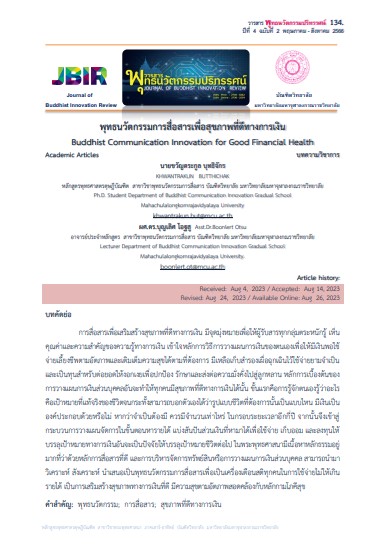Buddhist Communication Innovation for Financial Good Health
Main Article Content
Abstract
Communication for good financial health, it has objectives to raise awareness of all groups of audiences realizing the value and the importance of financial literacy, and understanding the principles and methods of financial planning for managing asset regarding to the basic needs and to fulfill the desirable happiness, to reserve in case of emergency, and to invest for asset growth aiming to protect, preserve and pass forward to the next generation. The basic principles of personal financial planning can make everyone to be in good financial health. Firstly, knowing yourself what your true purpose was and what kind of lifestyle you want. If it depends on the money, what amount should be paid in the next few years? Secondly, entering the process of financial planning to generate the income, to allocate the money for spending, to save, and to invest for achieving the financial goal that related to the life objective in the future. According to the Buddhism, there are many doctrines about the principles of good communication and asset management or personal financial planning. They can be analyzed, synthesized, and presented as a Buddhist communication innovation. Furthermore, they can remind everyone to be mindful that does not spend more than their income, to promote good financial health, and to stay pleasantly with the Buddhist principle of Sensual Pleasure.
Article Details

This work is licensed under a Creative Commons Attribution-NonCommercial-NoDerivatives 4.0 International License.
เรื่องลิขสิทธิ์/เป็นความคิดเห็นของผู้เขียน
References
เอกสารอ้างอิง :
หนังสือ :
จักรพงษ์ เมษพันธุ์. (2562). MONEY 101 เริ่มต้นนับหนึ่งสู่ชีวิตการเงินอุดมสุข. กรุงเทพมหานคร: บริษัทซีเอ็ดยูเคชั่น จำกัด (มหาชน).
วศิน อินทสระ. (วศิน อินทสระ). สู่เสรีภาพทางจิต คู่มือการปฏิบัติสมถะและวิปัสสนาอย่างง่าย. เชียงใหม่: บริษัท สันติภาพแพ็คพริ้นท์ จำกัด.
พระพรหมวชิรญาณ (ปสฤทธิ์ เขมงฺกโร สุทธิพันธุ์).(2561). เพชรพระไตรปิฎก. กรุงเทพมหานคร: โรงพิมพ์เจริญการพิมพ์.
พระศรีคัมภีรญาณ (สมจินต์ วันจันทร์.รศ.ดร.). (2556). พุทธปรัชญา.กรุงเทพมหานคร: โรงพิมพ์มหาจุฬาลงกรณราชวิทยาลัย.
พระศรีธรรมภาณี (วัลลพ โกวิโล). (2559). ธรรมนิเทศ ปกิณณกกถา-มงคลกถา-ธรรมเทศนา. กรุงเทพมหานคร: โรงพิมพ์ พระพุทธศาสนาของธรรมสภา.
มหาวิทยาลัยมหาจุฬาลงกรณราชวิทยาลัย. (2539). พระไตรปิฎก ภาษาไทยฉบับมหาจุฬาลงกรณราชวิทยาลัย. กรุงเทพมหานคร: โรงพิมพ์มหาจุฬาลงกรณราชวิทยาลัย.
สมเด็จพระพุทธโฆษาจารย์ (ป.อ.ปยุตฺโต). (2561). พุทธธรรม (ฉบับเดิม). กรุงเทพมหานคร: โรงพิมพ์พระพุทธศาสนาของธรรมสภา.
แวอาซีซะห์ ดาหะยี. (2556). หลักนิเทศศาสตร์. ภาควิชานิเทศศาสตร์ คณะวิทยาการจัดการ มหาวิทยาลัยราชภัฏยะลา.
วารสาร :
กฤษฎา เสกตระกูล. (กุมภาพันธ์-พฤษภาคม 2553). การวางแผนการเงินส่วนบุคคล: เมื่อประชาชนมั่งคั่งประเทศชาติก็มั่นคง. บทความทั่วไป. วารสารสถาบันวิชาการป้องกันประเทศ; 2553. 8(4): 5.
Reference :
Books :
Chakraphong Maesapan. (2019). MONEY 101: Starting from Scratch Towards a Financially Abundant Life. Bangkok: SE-ED Education Public Company Limited.
Wasin Intasara. (Wasin Intasara). Towards Mental Freedom: A Simple Guide to Samatha and Vipassanā Practice. Chiang Mai: Santipap Packprint Co., Ltd.
PhraPhromwachirayan (Pasarit Khemangkaro Sutthiphan).(2018). Phet Phra Traipitak. Bangkok: Charoen Printing House.
Phra Sri Khamphiranyan (Somjin Wanchai, Assoc. Prof. Dr.). (2013). Buddhist Philosophy. Bangkok: Mahachulalongkornrajavidyalaya Printing House.
Phra Sri Thammaphani (Vallop Kovilo). (2016). Dhammanithet: Miscellaneous Discourses, Auspicious Discourses, and Sermons. Bangkok: Dhamma Sabha Buddhist Printing House.
Mahachulalongkornrajavidyalaya University. (1996). Thai Tripitaka Mahachulalongkornrajavidyalaya Edition. Bangkok: Mahachulalongkornrajavidyalaya University Printing House.
Somdej Phra Buddhaghosacharya (P.O. Payutto). (2018). Buddhadhamma (Original Edition). Bangkok: Dhamma Sabha Printing House. The Buddhist Teachings of Dhamma Sabha.
Wa'azizah Dahayi. (2013). Principles of Communication Studies. Department of Communication Studies, Faculty of Management Science, Yala Rajabhat University.
Journal :
Kritsada Sektrakul. (February-May 2010). Personal financial planning: When people are wealthy, the nation is stable. Journal of the National Defence College. 8(4); 5.


